Yesterday’s Dead by Pat Bourke
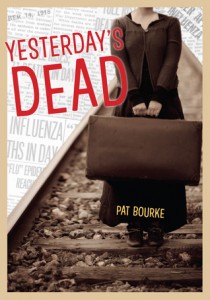 Summary: Thirteen year-old Meredith is headed to Toronto to work as domestic servant after her father’s death leaves her family with a lot of debt. It’s 1918 and nearing the end of World War I when the Spanish Flu hits soon after Meredith starts working at the Watertons. One by one, those in charge of the household contract the deadly flu, and Meredith is left to take care of them all with minimal help from Dr. Waterton’s entitled daughter Margaret. Fighting to keep everyone alive will test them both but ultimately not everyone will survive.
Summary: Thirteen year-old Meredith is headed to Toronto to work as domestic servant after her father’s death leaves her family with a lot of debt. It’s 1918 and nearing the end of World War I when the Spanish Flu hits soon after Meredith starts working at the Watertons. One by one, those in charge of the household contract the deadly flu, and Meredith is left to take care of them all with minimal help from Dr. Waterton’s entitled daughter Margaret. Fighting to keep everyone alive will test them both but ultimately not everyone will survive.
Number of Pages: 256
Age Range: 12-14
Review: Pretending to be fifteen so she can work and send money home to her family to pay her father’s debts, Meredith ends up in Toronto in 1918, just before the Spanish Flu arrives. Used to doing household chores, Meredith suddenly finds herself playing nursemaid and cook after Mrs. Butters, the household’s actual cook, takes ill.
Struggling to care Mrs. Butters while Dr. Waterton spends day and night working at the hospital to help stem the epidemic, Meredith finds herself trying to save what seems like a sinking ship as Harry gets ill and then Parker and then Jack.
Even though Meredith is just thirteen, she manages while fighting exhaustion, caring for the family she has just become attached to with heart and determination. She’s a remarkable character who deals with frightening situations and sudden responsibility gracefully and with a level head.
Yesterday’s Dead is an eye-opening portrayal of an historical event that left many children in the role of caregiver, or worse, orphans, just as World War I was finally ending.
Memorable Quotes:
“The newspaper had been delivered to the gate. There it was again – the headline ‘Yesterday’s Dead’ – posted over a grim list of the names and address of the people in Toronto who’d died from the Spanish Flu the day before, the same way the paper listed the names of the soldiers who’d died overseas. It seemed to her that the Spanish Flue was like an invading army, leaving grief in its wake as it spewed casualties.” – Meredith from Yesterday’s Dead by Pat Bourke, page 211
Yesterday’s Dead by Pat Bourke is published by Second Story Press, (2012).
(Buy this book: Amazon | Indigo
| Canadian Booksellers)
Wondrous Strange by Lesley Livingston
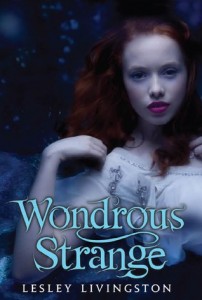 Summary: Kelley Winslow is excited to be promoted from understudy to the role of Titania, queen of the faeries in an off-Broadway production of William Shakespeare’s Midsummer Night’s Dream when the lead actress breaks her ankle. Though Kelley is immersed in the world of faeries in her professional life, when the faerie world starts bleeding into her personal life, she remains a bit skeptical. A chance meeting with Sonny Flannery sparks an attraction and a trip down a rabbit hole of sorts as Kelley finds out that not only is she a faerie herself, but she is the daughter of the king of faeries who was abducted by a human woman when she was just a baby. It’s the end of October, which means the gate between the faerie world and the human world is open for nine days, or, in other words, just enough time to turn Kelley’s world completely upside-down.
Summary: Kelley Winslow is excited to be promoted from understudy to the role of Titania, queen of the faeries in an off-Broadway production of William Shakespeare’s Midsummer Night’s Dream when the lead actress breaks her ankle. Though Kelley is immersed in the world of faeries in her professional life, when the faerie world starts bleeding into her personal life, she remains a bit skeptical. A chance meeting with Sonny Flannery sparks an attraction and a trip down a rabbit hole of sorts as Kelley finds out that not only is she a faerie herself, but she is the daughter of the king of faeries who was abducted by a human woman when she was just a baby. It’s the end of October, which means the gate between the faerie world and the human world is open for nine days, or, in other words, just enough time to turn Kelley’s world completely upside-down.
Number of Pages: 327
Age Range: 13-15
Review: Full of action, secrets, and romance, Wondrous Strange by Lesley Livingston takes Kelley from pretending to be a faerie in the famous Shakespeare play to finding out that she actually is one.
Faeries seem to be mischievous and evil, stealing babies from humans because they have trouble having their own. But this child-napping is what starts all the trouble as some mothers aren’t willing to just let their babies go. It’s especially frustrating when Sonny and his friends reveal being abducted means the children and the adults they become have no home at all. Faeries aren’t known for being particularly loving, and end up treating their new children much like pets and playthings.
For Kelley though, a faerie taken by humans, life is different. She does belong in the human world, and she has many people who care about her. I think this is why it appears to be so easy for her to give up her faerie powers in order to protect Sonny and salvage any relationship that might be in their future. One, she doesn’t know what she is really giving up. And two, she has no yearning to find home that would draw her to the faerie kingdom because she has a home already.
It’s the beginning of a trilogy and Livingston knows how to keep her reader wanting more. I had quite a few questions by the end of the story, which I assume have been addressed in the books following. Although it is possible I missed some things, because when it comes to stories about faeries I have to pay very close attention as it is a world I know little about.
I loved the connection with Shakespeare’s play, and having Puck be the actual Robin Goodfellow was an especially sweet touch. Next time I see Midsummer Night’s Dream I think I’ll be wondering if any faeries are hiding out in the cast.
Memorable Quotes:
“‘Home, Fenn?’ Maddox suddenly rounded on him. ‘What is that exactly? Where is it? And when? We’ve none of us homes now but this. This here and this now. We had our homes taken from us.’ He turned to face the rest of the Guard. ‘I’ve seen this girl, and she belongs in this realm. Would you have the Faerie king take her away from everything she has ever known?’ He turned back to Fennrys Wolf. ‘Would you honestly wish our fate upon her?'” – Maddox from Wondrous Strange by Lesley Livingston, page 230
Wondrous Strange by Lesley Livingston is published by HarperTrophy Canada, (2009).
Witchlanders by Lena Coakley
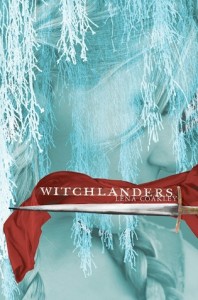 Summary: Ryder and Falpian are two teens from the warring Witchlander and Baen people. Raised to hate each other and to believe in different deities, when they come in closer contact and realise they are linked through a mysterious mind connection, their first instinct is to kill one another. But when Falpian’s father tries to have him assassinated and the witches from Ryder’s community won’t acknowledge that his mother Mabis can see the evil that will soon befall them, Ryder and Falpian must find a way to work together to unravel the secrets surrounding the contention between their people. Both sides seem to be trying to rekindle the war, and it is up to Ryder and Falpian to stop them.
Summary: Ryder and Falpian are two teens from the warring Witchlander and Baen people. Raised to hate each other and to believe in different deities, when they come in closer contact and realise they are linked through a mysterious mind connection, their first instinct is to kill one another. But when Falpian’s father tries to have him assassinated and the witches from Ryder’s community won’t acknowledge that his mother Mabis can see the evil that will soon befall them, Ryder and Falpian must find a way to work together to unravel the secrets surrounding the contention between their people. Both sides seem to be trying to rekindle the war, and it is up to Ryder and Falpian to stop them.
Number of Pages: 400
Age Range: 14-16
Review: Wrapped in a vivid fantasy-genre story about two teens from different lands is wisdom and insight applicable to modern day life as Lena Coakley tackles religion, racism, gender equality and class systems through her novel, Witchlanders. Coakley’s talented writing immediately immerses her reader into a world where mystical powers are real and people can shake bones to predict the future and sing spells into existence.
And yet it’s relatable. Ryder’s tale begins with his family life. His father has died and he is taking care of the farm as best he can while also trying to stop his mother from taking Maiden’s Woe, a powerful narcotic type plant that she says helps her see the future. Ryder is focussed on taking care of his family at all costs, but when that means he has to leave them to defend the community he is willing to do so for their ultimate good.
As for Falpian, the disappointment of his father and the death of his twin brother weigh on him heavily. It takes courage for him to not allow himself to be killed to start a war as his father intends, and being open to collaborating with a Witchlander takes a lot of empathy and a willingness to see the bigger picture without turning away in fear.
I loved the mystery surrounding the deities and the lengths the witches go to in their efforts to cover up the truth. If the Baens and Witchlanders were allies instead of enemies, would they each have a talat-sa? What an incredible idea to promote understanding between the peoples as each person shares their talat-sa’s memories and experiences! Since each group has their own deity/deities and one seems to be bent on putting women down at all costs (read my Memorable Quotes section, Coakley’s portrayal of this is so powerful and filled with hatred it is frightening) I would think being able to see into another person’s mind would be the best way to make them see the other side of things.
I was so disappointed to read there is no Witchlanders sequel in the works, because reading Coakley’s book for the second time just reminded me how much I love the story and of my desire to know more about Kar and the Goddesses. I love the little snippets of backstory Coakley provides through her quotes from The Magician’s Echiridion, and this is definitely one of those times where I am jealous of a writer for being able to invent such a rich world and having access to it all of the time. I won’t know more about the Witchlanders and the Baens unless Coakley writes another book, but Coakley created her characters and can think about the other adventures they might have whenever she wants.
My favourite character was Bo, the dreadhound, because he’s so loyal even when Falpian is convinced he is being loyal to the wrong person. Plus I just loved Coakley’s description of him being a bundle of fur in the beginning. Easy to imagine, and so endearing. Coakley’s description of Falpian being caught in a tunnel with a large number of spiders was also vivid, but not endearing as it made my skin crawl.
As I recall, this was a book that did well on the White Pine reading list, and it is one I would recommend to male and female readers alike. Even if you’re not usually a fantasy reader, Coakley’s writing transcends the genre and is highly enjoyable for all.
Memorable Quotes:
“Skyla was singing softly to Pima in the other room – a lullaby of Fa’s – and without warning, a feeling of loss pierced him. He’d become used to it since Fa died, surprise attacks of emotions that came out of nowhere, left him breathless. But he realized it wasn’t his father that he was missing so painfully at this moment. It was his mother. His mother as she used to be. Mabis had been like iron once. She’d been like stone. Nothing could break her. And he’d felt entirely safe.” – Ryder from Witchlanders by Lena Coakley, page 10
“Mabis pursed her lips and stared into the flames. After a while she took his arm again, gently this time. ‘You know, Ryder,’ she said. ‘There is a lot more to the world than what you can see. Sometimes I think it was very wrong of me not to teach you that.'” – Mabis from Witchlanders by Lena Coakley, page 35
“The mission was on course, he tried to tell himself firmly. His father wanted him to die, and he was going to do it. His father wanted to make it look as if Falpian had been killed by witches, and now he really was going to be killed by witches. Missions weren’t supposed to be easy, after all.” – Falpian from Witchlanders by Lena Coakley, page 209
“Cursed are those who believe in a Goddess, who cannot see that a world created by a woman would be a backward place, that rivers would run uphill, animals would rule over humans, the sun would give off darkness instead of light.
But worse still is the Baen woman who tries to sing.
Remove her from the company of other women. Cut out her voice, and fill her mouth with mud.
Make her silent.” – The Magician’s Echiridion from Witchlanders by Lena Coakley, page 229
“Skyla buried her face in the shoulder of his reds and let out a sob. ‘I thought the people here would be like Fa. He knew. He knew there was some kind of magic running through the world’s veins. He could feel it.’ She tood back and wiped her eyes. ‘He made me feel it too. He taught me that the whole world was a holy place. That’s why he loved our old farm, loved the dirt under his feet. Everything was magic to him.'” – Skyla from Witchlanders by Lena Coakley, page 312
“No, Falpian thought. No, no. ‘Please. You have the wrong person.’ There was desperation in his voice now. ‘I don’t want to hurt people. I’m not like you. I – I don’t have an assassin’s heart.’
The witch’s face softened into something like pity. ‘Do you think anyone is born a killer? Do you think I was? Trust me, I know what I’m asking. An assassin’s first murder is himself. He kills the man he was.’ Falpian gave a little start, thinking of his father. Had he killed the man he was?” – Conversation between Falpian and a witch from Witchlanders by Lena Coakley, page 337
Witchlanders by Lena Coakley is published by Atheneum Books for Young Readers, (2011).
When We Were Good by Suzanne Sutherland
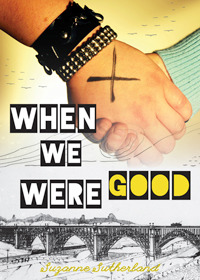 Summary: Katherine Boatman loses her bearings after her grandmother dies on New Years Eve. The new millennium brings change for Katherine as she begins her last semester of high school, drowning in grief and trying desperately to find a reason to go on with life. A new friendship at school with a girl named Marie opens her up the world of punk music, and to truths about herself Katherine was previously unaware. In the midst of questioning her sexual preferences, Katherine is also dealing with losing the friendship of her best friend, conflict and apathy from her parents, as well as keeping up with her schoolwork. Unsure of a future where she admits she is gay, Katherine takes things one step at a time, finding support and love to be who she is.
Summary: Katherine Boatman loses her bearings after her grandmother dies on New Years Eve. The new millennium brings change for Katherine as she begins her last semester of high school, drowning in grief and trying desperately to find a reason to go on with life. A new friendship at school with a girl named Marie opens her up the world of punk music, and to truths about herself Katherine was previously unaware. In the midst of questioning her sexual preferences, Katherine is also dealing with losing the friendship of her best friend, conflict and apathy from her parents, as well as keeping up with her schoolwork. Unsure of a future where she admits she is gay, Katherine takes things one step at a time, finding support and love to be who she is.
Number of Pages: 227
Age Range: 14-16
Review: After her grandmother dies, Katherine finds herself isolated and friendless as her parents are busy with their jobs and her former best friend is focussed on her boyfriend and hating Katherine for dating her brother. When she is befriended by Marie, Katherine begins to feel things she wasn’t expecting, and friendship turns to love.
I liked the setting of Toronto, especially the part about the Bloor Viaduct. The picture of it on the cover is instantly recognizable. Katherine’s comments about the Luminous Veil were insightful and sadly accurate because its installation did not affect the overall suicide rates in Toronto.
When We Were Good is about a girl trying to find meaning after the death of a loved one. Katherine takes finding a 50 dollar bill as a sign that she needs to do something good, but struggles for the entire book to figure out what it might be. I was surprised she would actually jump on the subway tracks to retrieve the $50, especially since her parents were rich and would have definitely given her another one.
The premise behind using the $50 to cheer up Marie though was sound. There’s a quote from the Talmud that reads “whoever saves a life, it is considered as if he saved an entire world.” In this case, Katherine and Marie end up saving each other.
My favourite part though was when Katherine reads Runaway Feeling by Tracy-Anne Sugar and it changes her life as she recognizes herself in it. It’s a prime example of bibliotherapy, because Katherine describes it as “a cheat sheet for my soul.” What a perfect way to describe a book that touched you on a personal level. I wish I had thought of it, and I wonder who Suzanne Sutherland’s Tracy-Anne Sugar was.
Memorable Quotes:
“I shut off every part of me but my ears, trying to let the pure sound take me over. The hairs on my arms stood on end. That kind of radical honesty, the ability to completely be yourself through your art, was something I knew I’d never be capable of. I cried until the album was over.” – Katherine from When We Were Good by Suzanne Sutherland, page 56
“I wanted to make a grand gesture. Something to give people hope. Hell, something to give myself hope. I wanted to say something to everyone walking around with their eyes shut to the world, something about how we never really have enough time with the people in our lives who’ve helped make us what we are, but that we have to be able to live the way they taught us.” – Katherine from When We Were Good by Suzanne Sutherland, page 99
“Marie was gay. A lesbian.
Marie was Marie.
Marie was too much too close too soon.
Marie was really something.” – Katherine from When We Were Good by Suzanne Sutherland, page 127
“Getting away from the emptiness of things – wealth, relationships, love, whatever. Nothing feels special when you have it all the time. So maybe the only way to make a life seem special is to cut it short. It seemed so perfect and so obvious. An inevitability, a perfect, symbolic solution.
Which is stupid, which is selfish, which is nothing Grandma would have ever found value in. Which can’t be the way to be a good person. Which can’t be anything. But it felt so tempting, so seductive. So simple and so definitive. Cutting it short.” – Katherine from When We Were Good by Suzanne Sutherland, page 151
“I went back up to my room to get Runway Feeling and set a place for myself at the dining room table. I’d already finished reading the book at school, but when I got to the last page I felt this insane pull to flip back to the beginning to start again. Everything this woman had written seemed right and bold and free. It was like she’d taken every word I’d been too afraid to say out loud and marked them down for me. Like a cheat sheet for my soul or something. It was kinda scary, but so, so cool.” – Katherine from When We Were Good by Suzanne Sutherland, page 170
“The next day was Friday. I couldn’t believe how long the week had been. It wasn’t enough to find the answer to all the world’s problems and then to have to face your death, apparently. You still had to go to chemistry class.” – Katherine from When We Were Good by Suzanne Sutherland, page 221
When We Were Good by Suzanne Sutherland is published by Sumach Press, (2013).
What Happened This Summer by Paul Yee
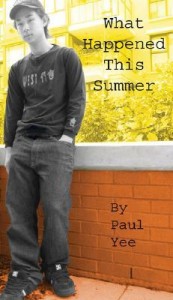 Summary: A collection of short stories featuring Chinese teens living in Toronto. Stories cover generational rifts, identity issues, sexuality, immigration, the bonds of family and culture in the midst of the regular stress of finishing high school and growing up.
Summary: A collection of short stories featuring Chinese teens living in Toronto. Stories cover generational rifts, identity issues, sexuality, immigration, the bonds of family and culture in the midst of the regular stress of finishing high school and growing up.
Number of Pages: 178
Age Range: 15-17
Review: Sadly, a day is not long enough to do justice to a collection of short stories. I liked the way Paul Yee connected the stories in his book by using and referring to characters who all knew each other, but I needed more time to let the stories sink in and realise their true meaning.
A couple did strike me though. The first was the one about Julie and it was called “Reading Made Me Have Sex.” Julie lives with her overprotective aunt and uncle who guard her closely to such lengths that Julie empathizes with the dystopian world of Margaret Atwood’s A Handmaid’s Tale. All of this monitoring has only taught Julie to be more secretive about doing what she wants to. It’s a complicated story because Julie’s aunt and uncle are driven by the fact that they already lost a son to a car accident, and their protectiveness is fuelled by their painful knowledge of grief and guilt. Julie, however, is fearful and resentful and waiting until she graduates to just get away from them. I believe her aunt and uncle’s actions were fuelled by love, but lost something in its expression.
The other story that stayed with me was “Death Seems to Linger.” Simon’s parents died when he was just four years old, his father because of an accident, and his mother as the result of suicide. Growing up Simon was often told his mother was crazy and her mother was as well, but when his grandmother sends him a great deal of money to visit her in Hong Kong, he gets the chance to find out for himself if that is true. What he discovers is things are more complicated than they seem, and Yee leaves his reader with a startling revelation at the end of the story.
It was another eye opening read for me as Yee explores growing up in a Chinese community. There are a variety of experiences within the same community causing rifts in understanding and communication between generations. Reputation is of utmost importance, as is keeping one’s word. There’s so much tension and pressure building just under the surface of relationships, but empathy is difficult to come by. I’ve only read two of Paul Yee’s books, but those books definitely make me want to read more of his work.
Memorable Quotes:
“It’s warm today, with clouds in the sky, but not too dark – excellent for taking pictures with black-and-white film. On days like this the light is very soft, and you can record an amazing range of greys, blacks and whites. The camera is special this way. It accepts the world’s colours and textures honestly. It’s not like the human eye, censoring everything for safe consumption, shutting out the ugly miseries that we don’t want to see. Under this even light, the camera captures every wrinkle, every spot and every hair on your face. It shows a truth you can’t find anywhere else.” – Julia in Astronaut Dads Are a Pain from What Happened This Summer by Paul Yee, page 84
“My words pour out: ‘Kevin has Chinese friends, he likes Chinese food and now he wants to study in China. He’s going all out for something he wants, even if it looks strange. But you, you’re the opposite. All your life, you’ve tried to be invisible. Your room is all white. Your clothes are plain. You’re nice to everyone. You don’t get into trouble. Kevin was perfect until he became the one thing that didn’t fit into your world. A high-profile Asian.'” – Joyce in We’re Dating White Guys from What Happened This Summer by Paul Yee, page 121
What Happened This Summer by Paul Yee is published by Tradewind Books, (2006).
Wanting Mor by Rukhsana Khan
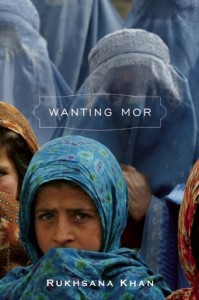 Summary: When her mother dies, Jameela and her father move quickly to Kabul, Afghanistan, where her father remarries. His new wife doesn’t like Jameela, and convinces him to abandon her in the marketplace. Taken in by a kindly butcher and his family, Jameela makes new friends until they send her to an orphanage because they can’t take on the responsibility of another dependent. It turns out though that the orphanage is the best thing to ever happen to Jameela because there she is educated and appreciated, plus a surgeon from the American army fixes her cleft lip. Circumstances conspire for Jameela to cross paths with her father again, but this time it is up to her to decide the nature of their relationship.
Summary: When her mother dies, Jameela and her father move quickly to Kabul, Afghanistan, where her father remarries. His new wife doesn’t like Jameela, and convinces him to abandon her in the marketplace. Taken in by a kindly butcher and his family, Jameela makes new friends until they send her to an orphanage because they can’t take on the responsibility of another dependent. It turns out though that the orphanage is the best thing to ever happen to Jameela because there she is educated and appreciated, plus a surgeon from the American army fixes her cleft lip. Circumstances conspire for Jameela to cross paths with her father again, but this time it is up to her to decide the nature of their relationship.
Number of Pages: 192
Age Range: 13-14
Review: I love the title of Rukhsana Khan’s Wanting Mor because of it has a double meaning. Yes, Jameela is wanting Mor, her mother, grieving her loss and the way her life changed so drastically after her death, but it is also about Jameela wanting and deserving more from her life. Born with a cleft lip and abandoned by her father in Kabul, Jameela must rely on the kindness of others to survive. An intelligent and hard worker, Jameela revels in the opportunity she gets to be educated, and becomes an instructor so she can support herself in the future. She is a kind person who surpasses the many obstacles placed before her. In some ways, her story is a little like Jane Eyre.
All throughout Khan’s book is a thread of spirituality and religion. Jameela is a follower of Islam living in Afghanistan where woman are encouraged to cover themselves with Chadors and Porani, and those that don’t cover up adequately are subjected to sexual abuse. In Jameela’s case, at first she seems mainly to use a Porani (a head scarf that can also cover part of a woman’s face) to hide her cleft lip and because her mother taught her to. When her cleft lip is fixed, her use of a Porani and then a Chador (full covering from head to knees with a mesh screen for the wearer’s viewing purposes) become more a symbol of her faith, and a deterrent for unruly men. After years of having a cleft lip, I’m sure the attention she received when it was fixed was startling, and I can see why she would want to protect herself.
I enjoyed Khan’s book because it was a completely different perspective for me. It’s easy to see Chadors as being oppressive in our Western culture, but I didn’t feel like Jameela was oppressed while wearing it. Instead, it seemed to give her a sense of power, confidence, and invisibility. Given all she had been through in her life, it was easy to see why that would be appealing to her. It was an enlightening and educational read.
Memorable Quotes:
“Mor was wrong. Being good isn’t enough. You have to be beautiful or at least rich.
And despite the Prophet’s advice (peace be upon him), I am angry. So angry I’m trembling.
The tears flow, and for once I can’t stop them. They’re so hot they could burn me. They make my pillow damp. Some even trickle into my ear.
I try to muffle my sobs. I don’t want to wake Soraya. I don’t want to talk about it. I just want to forget.
And when my eyes are all puffy and swollen and I just can’t cry any more, what has changed? What have I solved? Nothing. Anger is for people who can do something about it.” – Jameela from Wanting Mor by Rukhsana Khan, page 70
Wanting Mor by Rukhsana Khan is published by Groundwood Books, (2009).




 Amy Mathers has been passionate about reading from a very young age, and hopes others will share her enthusiasm for funding a teen book award.
Amy Mathers has been passionate about reading from a very young age, and hopes others will share her enthusiasm for funding a teen book award. 





